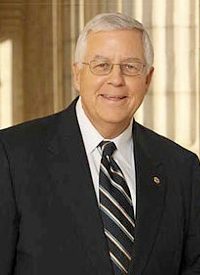
Senator Mike Enzi (R-Wyo.) has announced that he plans to introduce legislation to reverse the ban on incandescent light bulbs which is scheduled to go into effect January 1, 2014. The ban was included in a comprehensive energy bill that President George W. Bush signed into law in 2007 as an amendment, and was intended as a means of saving energy and limiting pollution.
Senator Enzi’s repeal legislation, the Better Use of Light Bulbs Act (BULB), S. 395, has 27 co-sponsors, including Senator John Barrasso (R-Wyo.) and Senator Jim DeMint (R-S.C.), the latter of whose office issued the following statement on the legislation:
The ban was intended to save on electricity costs and limit pollution by replacing traditional incandescent light bulbs with energy-efficient compact florescent light bulbs (CFLs).
However, CFLs are more expensive, many contain mercury which can be harmful even in the smallest amounts, and most are manufactured overseas in places like China. In September 2010, the last major GE manufacturing plant for incandescent light bulbs in the U.S. closed in Winchester, Virginia and 200 jobs were lost.
“I think it’s fine if someone wants to fill their home or business with the light from the new bulbs. I also think it is fine if someone wants to buy an old-fashioned bulb because it works better for them. If left alone, the best bulb will win its rightful standing in the marketplace. Government doesn’t need to be in the business of telling people what light bulb they have to use,” said Senator Enzi, who authored the BULB Act.
“Washington needs to stop picking winners and losers in the marketplace and micromanaging how Americans live their lives,” said Senator DeMint, the lead co-sponsor of the bill. “Americans are fully capable of choosing the best way to light their own homes and what best fits the needs and budget of their families. When Congress dictates which light bulbs folks in South Carolina must buy, it’s clear the ‘nanny state’ mentality has gotten out of control in Washington.”
A similar bill, H.R. 91, was also introduced in the House by Representative Joe Barton (R-Texas), along with Reps. Michael Burgess (R-Texas), Marsha Blackburn (R-Tenn.), and 12 other Republicans. In a February 1 editorial in USA Today Barton observed of the incandescent light bulb ban:
Voters sent a message in November that it is time for politicians and activists in Washington to stop interfering in Americans’ lives and manipulating the free market. The light bulb ban is a glaring example of that frustration.
When I introduced the BULB Act, it wasn’t designed as an attack on energy conservation. It was to defend personal freedom.
People don’t want Congress dictating the lighting they can use. Traditional incandescent bulbs have been brightening the night since Thomas Edison created the first one in 1879. They are safe, cheap and reliable.
This de facto ban has nothing to with public safety because unlike lead paint, leaded gasoline and asbestos, the old-fashioned light bulbs in your home pose no danger.
It is a different story for the most prominent alternative, compact fluorescent lights, or CFLs. They are more expensive, contain hazardous mercury, and recently The Wall Street Journal reported that their promised longevity is exaggerated by almost 33%. Tests by an electric company in California show the CFLs have higher burnout rates in areas where lights are turned on and off frequently, such as bathrooms. Then there are consumer complaints that they emit a light that is annoying and in severe cases even gives them headaches.
So why force them on the American people?
The bill passed in 2007, the Energy Independence and Security Act of 2007, was sponsored by 199 members of Congress, including former Moderate Republican Reps. Chris Shays (Conn.), Wayne Gilchrest (Md.), and Rep. Roscoe Bartlett (Md.). In addition to the provision seeking to phase out incandescent light bulbs, the bill also imposed a wide array of environmentalist and fiscally reckless programs, including:
• Taxpayer funds being used for increased production of ethanol and other biofuels (an endeavor which has proven to be a massive waste of taxpayer funds)
• Requiring federal buildings to adhere to “energy-efficient” standards, such as carbon neutralization and the exclusive use of Energy Star appliances
• Taxpayer funding for research and development of solar, geothermal, wind, and marine energy sources, such as windmills and solar panels
• Increased regulations targeted at the automobile industry, mandating raising auto fuel efficiency standards 40 percent
• Taxpayer funding for federal “green jobs” training programs, and the expansion of the federal bureaucracy through the creation of the unconstitutional Office of Climate Change and the Environment within the Department of Transportation (currently led by another moderate Republican, former Rep. Ray LaHood of Illinois)
Under the provisions of the legislation, the phase-out of incandescent light is to begin with the 100-watt bulb in 2012 and end in 2014 with the 40-watt. All light bulbs must use 25 percent to 30 percent less 2014. By 2020, bulbs must be 70 percent more efficient than they are today.
The legislation is an archetypical embodiment of how the environmentalist lobby seeks to impose its will through boosting government regulation and spending, limiting individual consumer choice, increasing the size of government, and centralizing power.
Senator Enzi’s bill was partly the result of a grassroots campaign led by the conservative group Freedom Action, which describes itself as “a web-based gathering of activists dedicated to self governance and free markets.” Its director, Myron Ebell, who is also the director of environmental and energy policy at the free-market oriented Competitive Enterprise Institute, observed the following about Freedom Action’s “Save the Light Bulb” campaign:
“The light bulb ban is an outrageous government limitation on consumer choice and intrusion into the home of every American. There is overwhelming public support that spans the political spectrum for repealing the ban on incandescent light bulbs. Freedom Action will marshal that support and focus it on Members of Congress. We are confident that Congress will repeal the ban this year after hearing from millions of constituents.”
Ebell also noted that the light bulb ban demonstrates a failure of the big-government proclivities seen in both the Democratic and Republican parties during the Bush era. The ban was the brainchild of both Rep. Jane Harman (D-Calif.) and Rep. Fred Upton (R-Mich.). Upton is a member of the moderate Republican Main Street Partnership and is a leading member of the Tuesday Group, a weekly meeting of moderate Republicans in the House and Senate modeled after the Wednesday Group, which was formed in 1963 as a forum for mostly northeastern liberal Republicans, such as Sen. Jacob Javits (N.Y.), Sen. Clifford Case (N.J.), and Rep. F. Bradford Morse (Ma.). Upton has a history of environmentalism; his congressional website once stated: “I strongly believe that everything must be on the table as we seek to reduce carbon emissions,” and in April 2009, he declared that “Climate change is a serious problem that necessitates serious solutions. Everything must be on the table.”
His support for the ban raised the criticism of prominent conservatives once it became apparent after Republicans reclaimed the House in November 2010 that Upton would most likely become Chairman of the House Energy and Commerce Committee. Fox News pundit Glenn Beck noted the following about the architect of the legislation Republicans are now seeking to repeal:
“Like many Republicans who lost in a primary this year, Upton voted for the $700 billion TARP bailout. One of just 18 Republicans to vote a year later for Barney Frank’s bill to give the Obama treasury department wide latitude in spending the remaining in $350 billion in TARP funds. This is exactly the kind of guy that the Republicans need to avoid or they’ll destroy themselves.”
Faced with conservative criticism and pressure, Upton changed his position on the light bulb ban, commenting, “The last thing we wanted to do was infringe upon personal liberties — and this has been a good lesson that Congress does not always know best,” in spite of the insurmountable damage done by his environmentalism: Bulbs have been banned, factories closed, jobs lost, and the personal liberties that he does not want to infringe upon were already infringed upon by Upton himself.
Other countries have also taken steps to phase out incandescent light bulbs, including Communist Cuba, which banned the sale and import of incandescent bulbs in 2005, and Venezuela, where Socialist President Hugo Chavez instituted a light bulb exchange program to replace millions of incandescent bulbs with compact fluorescent lamps, otherwise known as CFLs. Likewise, several progressive Democrats have also worked to institute similar programs in California, Connecticut, and New Jersey.
Many of these countries have realized the adverse economic impact caused by banning incandescent light bulbs. New Zealand reversed its ban in December 2008, to the chagrin of the country’s Green Party, and the United States has already seen economic havoc wreaked by this policy. In September 2010, 200 workers at a General Electric plant in Winchester, Virginia lost their jobs when the incandescent light bulb-producing plant shut down, as reported by The Washington Post:
The last major GE factory making ordinary incandescent light bulbs in the United States is closing this month, marking a small, sad exit for a product and company that can trace their roots to Thomas Alva Edison’s innovations in the 1870s. What made the plant here vulnerable is, in part, a 2007 energy conservation measure passed by Congress that set standards essentially banning ordinary incandescents by 2014. The law will force millions of American households to switch to more efficient bulbs.
The resulting savings in energy and greenhouse-gas emissions are expected to be immense. But the move also had unintended consequences.
Rather than setting off a boom in the U.S. manufacture of replacement lights, the leading replacement lights are compact fluorescents, or CFLs, which are made almost entirely overseas, mostly in China.
Enzi’s legislation is thus not only beneficial for America’s economic health, but is also salubrious for public health; because some environmentalists typicallyplace a greater value on the environment than on human life, they see nothing immoral about advocating the use of CFLs, which pose a threat to human health, though emitting less carbon. CFLs have powerful radiation-emitting electromagnetic fields which expose people to “dirty electricity,” which can lead to a fivefold increase in cancer; furthermore, because they are composed of mercury vapor, broken CFLs can be deadly, as users are exposed to possible mercury poisoning. In addition, the bulbs have been linked to severe neurological damage, as they can result in migraine and epilepsy attacks.
The BULB Act is expected to pass in the House if it is brought up for a simple majority vote, but is not expected to pass in the Senate, where Democrats retain a 53-47 majority over Republicans. Similar legislation was introduced in the House in September 2010, but failed to reach the House for an up-or-down vote. Various big business special interests have declared their continued support of the ban, including the Scandinavian home furnishings retailer IKEA, and the National Electrical Manufacturers Association (NEMA), the association of electrical and medical imaging equipment manufacturers.



